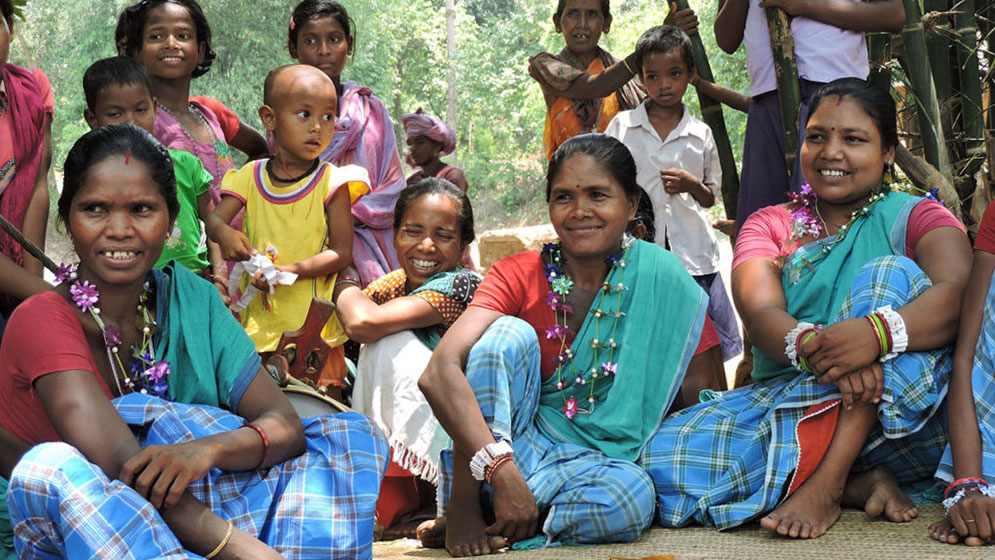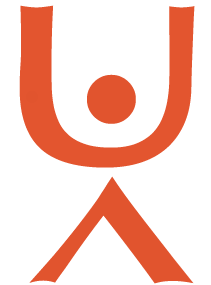When the Gulab Baha Self-Help Group was formed in Barmasiya village, the members didn’t know they were entitled to government social services for people living in extreme poverty.
Trickle Up partnered with local organization NEEDS in Jharkhand to help women in extreme poverty. One of NEEDS’ greatest strengths is educating and empowering marginalized communities to access government services related to livelihoods, health, and education. The coach for Gulab Baha, a member of NEEDS’ field staff, taught the women about the importance of savings, government and bank linkages, and advocacy.
Today, the women wear matching turquoise lungi (skirts) to honor the traditional style of Jharkhand. They chose Gulab–Rose in English–as their group name because they say it is the best flower. On average, each member has $38 (2,470 INR) in savings. Additionally, the women have learned about their rights and about opportunities to improve their families’ livelihoods, health, and education.
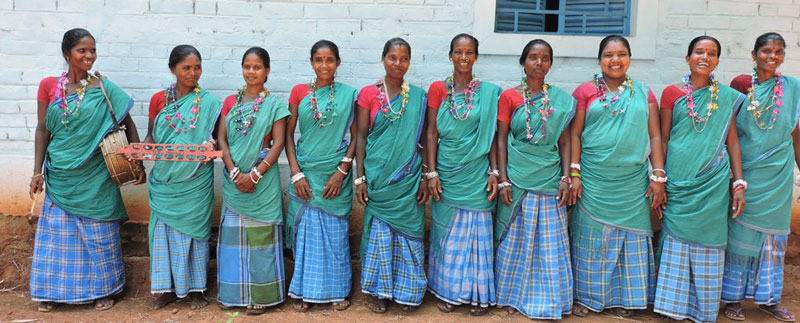
Livelihoods
As part of the Trickle Up program, the women of the Gulab Baha SHG had one-on-one coaching to develop livelihood plans. Poulina Kisku used her seed capital to purchase two pigs and three goats. She sold these at a profit to buy fish eggs, starting a collective fish farming business with three other SHG members in the village pond. After one year, the women made a total profit of $233 (15,000 INR). Poulina used her share of the profit to buy tiles for the roof of the house she’d built with support from a government housing program. She also saved $117 (7,500 INR) to invest in her agricultural activities during the productive monsoon season.
With her seed capital, Suhasini Hansda started a shop where she sells items like detergent, lottery games, and snacks. It is the only shop in the village and demand is high. Since she opened two and a half years ago, she has doubled the number of products in stock to meet demand. Her best-selling items are soap and cooking oil. She visits local markets in other villages to purchase her inventory, and manages the shop and its profits by herself. Suhasini also has agricultural land where she grows rice, but her plot only produces enough rice for her family’s own consumption.
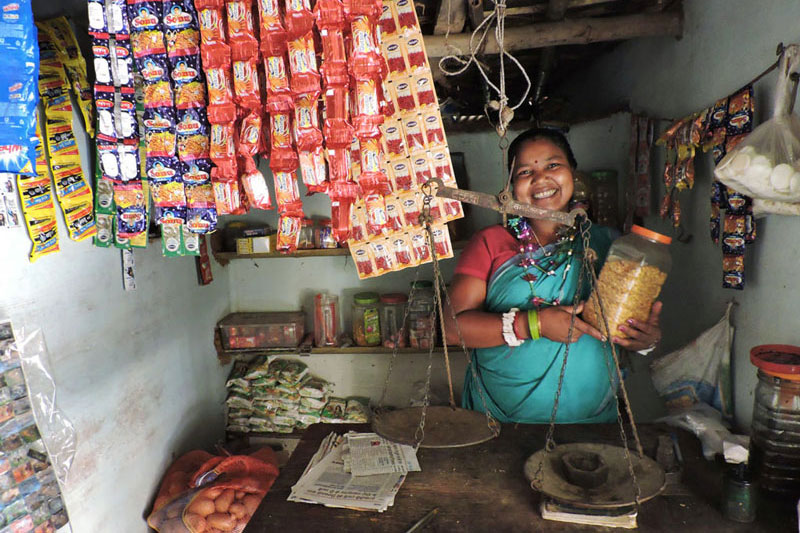
Suhasini used some of her profits from the shop to buy a bicycle and spent $54 (3,500 INR) for her husband to take a driving course. He is now a professional driver and is earning a higher income for the family. Previously, Suhasini and her husband migrated to find work four times per year for a month at a time. Now with Suhasini’s shop and her husband’s driving, they earn enough income to support their family without having to migrate for work.
In addition to their businesses, the women of Gulab Baha SHG work together to access government services that improve livelihoods and food security in their community.
Through Trickle Up’s program, the SHG members learned about the Indian government’s MGNREGA guaranteed work program, and secured job cards for all their members. The women also learned about a government-run Public Distribution System for people living below the poverty line. Eligible families receive rations of rice, sugar, kerosene, and other essential goods from a designated distributor. Corruption is rampant in this program, and the women discovered that the distributor in their area was cheating them out of their supplies. However, his warehouse is 12km from their community, so they can’t demand their rations in person. Instead, they are currently in the process of applying to make their SHG an official distributor for the program, bypassing the corrupt distributor altogether.
Health
In addition to economic resilience and self-sufficiency, the program has provided the women of Gulab Baha SHG with critical access to health care and information. The women learned about the importance of pre and postnatal care. As a result, Poulina Kisku, Talamay Kisku, Hemram Kisku, and Debi Murmu have all given birth in a government-approved clinic and received a weekly stipend of $22 (1,400 INR) to purchase nutritious food for post-partum recovery. Through the government program, the women also received free transportation to and from the clinic.
In addition, on the first Thursday of every month, an Accredited Social Health Activist (ASHA) visits the village with basic equipment to provide medical care. The women now know they can visit their local village health center to receive free vaccines, medicine, and check-ups for children under three. Pregnant women and lactating mothers can also receive food rations from the center. However, the nearest one is 3km from Barmasiya village, a barrier that prevents many women from accessing these benefits. The SHG discovered that any community with a population over 1,000 is entitled to have its own village health center so they’ve applied to the government for one in Barmasiya.
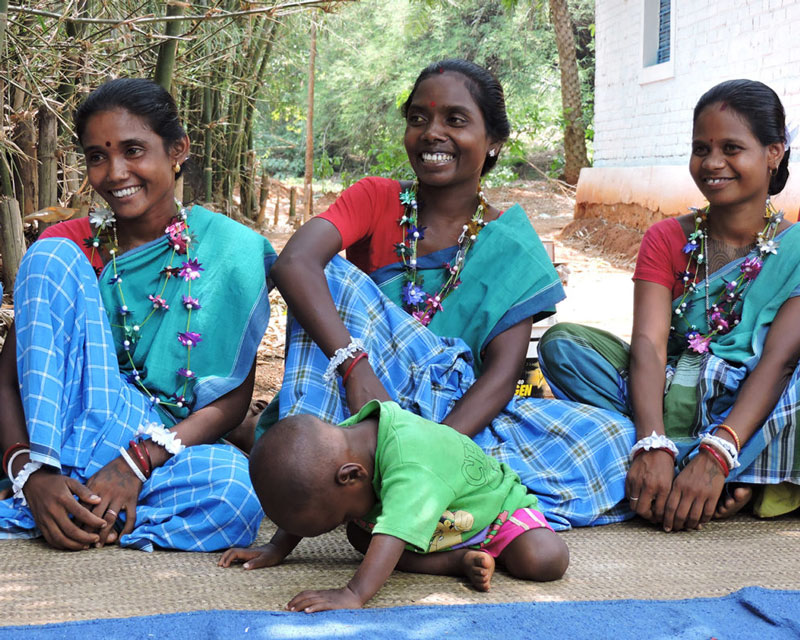
Education
Before the program, there was a common perception in the community that boys care for the cattle and girls tend to the household. Now, the mothers in Gulab Baha SHG understand the importance of sending both boys and girls to school. If her son complains, one mother said, she scares him into going to school by saying parents will be put in jail if their child doesn’t attend school.
NEEDS trained the School Management Committee (SMC), responsible for the local primary school, to create an annual school development plan, which must be approved by the government before funds are disbursed. Now, the SMC receives $155 (10,000 INR) each year from the government to pay for maintenance, repair, supplies, and food for the students. Students are entitled to free books, a uniform, and a daily meal. As an incentive to attend regularly, children also receive an annual stipend of around $3 (200 INR), depending on their class level. The women in Gulab Baha SHG are not on the SMC, but some of their husbands are on the committee. As SMC meetings are open to the community, the women attend regularly in order to monitor SMC activities and make sure it’s fulfilling its obligations. There is a secondary school in Litipara, a few kilometers away, where SHG members hope to send their children after they complete primary school.
Linkages to health, education, and other government programs can be transformative for women and families living in extreme poverty. Coupled with Trickle Up’s economic development program supporting women’s livelihoods, financial literacy, and social empowerment, our partnership with NEEDS in rural Jharkhand is providing communities with a comprehensive support system to kickstart a cycle of prosperity.

